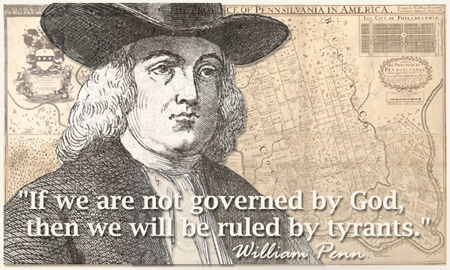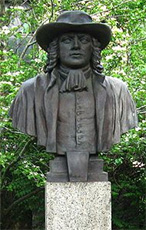
William Penn (1644-1718), founder of the Province of Pennsylvania, was born in London on October 14th, 1644. He entered Oxford University at age 16 and while there, rejected Anglicanism and began attending unauthorized Quaker prayer meetings. Moved by that experience, his heart was changed and he determined to devote his life to the spread of Christianity.*
Penn’s “religious nonconformity” resulted in his expulsion from Oxford, after which, his father sent him to a Protestant college in France, to complete his education. In his early twenties he spent a year in the Tower of London for writing a book attacking Trinitarian doctrines.
Thereafter, and until he left for the New World, he was regularly in trouble with the authorities and frequently imprisoned for his outspoken Christian views. His family was not thrilled. But these trials didn’t seem to faze him; he made productive use of his prison time, continuing with his theological writing.
Penn’s father was Admiral Sir William Penn. Upon his death in 1670, the Duke of York (future King Charles II) owed him huge sum of money. Unable to come up with the cash, he awarded a huge land grant (including present-day Pennsylvania and New Jersey) in America, to William as heir. Penn was made absolute proprietor of the territory and arrived in the New World in 1682. He named the land Pennsylvania, which means “Penn’s woods,” after his father.
Penn set out to make the province a haven for all persecuted denominations including, Quakers, Mennonites, Lutherans, Church of the Brethren and Moravians.* Guided by the commandment to “love thy neighbor,” he dealt fairly with the native Indians, earning their friendship and allegiance. Because men and women were equal in God’s sight, he insisted that women deserved equal rights with men. He believed in a “divine right of government” and sought to form the government of Pennsylvania as a “holy experiment” in governing.*
Borrowing from his friend John Locke’s philosophy, he set forth the governing structure for Pennsylvania in his “Frame of Government of Pennsylvania,” considered by many to be ahead of its time. Thomas Jefferson called Penn “the greatest law-giver the world has produced.”
From Wikipedia:

After Penn’s death, many of his legal and political innovations took root. His “Frame of Government” and his other ideas were later studied by Benjamin Franklin as well as the pamphleteer of the American Revolution, Thomas Paine, whose father was a Quaker. Among Penn’s legacies was the unwillingness to force a Quaker majority upon Pennsylvania, allowing his state to develop into a successful “melting pot”. In addition, Thomas Jefferson and the founding Fathers adapted Penn’s theory of an amendable constitution and his vision that “all men are equal under God” in forming the federal government following the American Revolution.
Philadelphia, the “City of Brotherly Love”, along with other towns in Pennsylvania, was designed by Penn with a grid pattern of streets, buildings, and public squares to promote health and fire safety. Following his death, Philadelphia continued to thrive, becoming one of the most populous colonial cities in the British Empire, reaching about 30,000 by the American Revolution, and becoming a center of commerce, science, medicine, and politics.
~~~~~~~~~~~~~~~
All told, the life and legacy of William Penn puts a huge lie to the Left’s revisionist claim that America was not founded by Christians – on biblical principles. Penn’s achievements were all the result of acting on his Christian worldview, following God’s word. With his faith to guide him, he demonstrated how people from different races and religions can live together in peace and prosperity.
“When it is tried, Christian faith will stand the test of trials ~
and is part of embracing the cross.” ~ Wm. Penn ~
*Source: Character for Life by Don Hawkinson ~ 37 profiles of faith-inspired men and women




